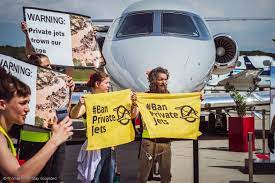This summer, as part of an expanding campaign against the emissions-producing lifestyles of the ultra-wealthy, climate activists spray-painted a super yacht, stopped private aircraft from taking off and filled in holes in golf courses.
As the earth warms to dangerous levels, causing more intense temperatures, floods, storms, and wildfires worldwide, climate activism has increased over the past few years. Radical tactics have been used by some demonstrators, including gluing themselves to public highways, disrupting prestigious sporting events like tennis and golf, and even painting or sopping famous works of art.
After spending a long time attacking some of the most profitable corporations in the world, including banks, insurance companies, and oil and gas conglomerates, they are now focusing on the wealthy.
Extinction Rebellion member Karen Killeen participated in demonstrations in Ibiza, Spain, a popular summer destination for the affluent. “We do not point the finger at the people but at their lifestyle, the injustice it represents,” she stated. According to her, the group is protesting pointless emissions like extremely wealthy people picking up a pizza by boat. “In a climate emergency, it’s an atrocity,” she declared.
Using spray paint, Killeen and other members of the environmentalist group Futuro Vegetal, often known as Vegetable Future, defaced Nancy Walton Laurie’s $300 million super yacht. Those protesting hoisted up a placard that read, “You consume, and others suffer.”
Around 100 protestors attached themselves to aircraft gangways and the exhibition gate in Geneva, disrupting Europe’s largest private jet sales event. A private airplane was spray-painted by the German environmental organization Letzte Generation on the vacation island of Sylt in the North Sea. Up in Spain, protesters filled up holes in golf courses to draw attention to the activity’s high water usage during hot, dry spells.
Abigail Disney, Walt Disney’s grandniece, and 13 other protesters were detained at the East Hampton Town Airport in New York in July for obstructing the movement of cars into and out of the parking lot. It was the first of up to eight operations conducted in the upscale Hamptons neighborhood. Additionally, protesters disrupted a museum gala, crashed a golf course, and marched in front of some exclusive mansions.
Luxury lifestyles are currently making a disproportionate contribution to the climate catastrophe, according to social scientist Dana Fisher from American University. According to a 2021 analysis by the charity organization Oxfam, by 2030, 16% of emissions related to global warming will be attributable to the wealthiest 1% of people. “It makes a lot of sense that these activists are exposing this harmful conduct.”
Luxury travel, according to Richard Wilk, an economic anthropologist at Indiana University, is “the real culprit” in the ultrawealthy’s emissions.
A super yacht with a permanent crew, a helicopter pad, submarines, and pools releases around 7,020 tons of carbon dioxide annually, which is more than 1,500 times more than a conventional family car. He provided estimates of the top billionaires’ annual emissions in 2021. Additionally, according to the non-profit organization Greenpeace, private planes in Europe alone last year produced more than 3 million tons of carbon pollution, which is equal to the average yearly CO2 emissions of nearly 500,000 EU citizens.
However, climate scientist Michael Mann from the University of Pennsylvania cautioned that shifting focus away from the wealthy and toward the fossil fuel industry, which is behind at least 70% of all emissions, could “play right into the hands of the fossil fuel industry and the ‘deflection campaign’ they’ve used to divert attention from regulation by emphasizing individual carbon footprints over the much larger footprint of polluters.”
He remarked, “The solution is to get everyone to use less carbon-based energy,” whether they are rich or poor.
Florida-based private plane charter company Monarch Plane Group’s president, David Gitman, urged activists to reconsider their course of action.
“I think that this kind of activism can help achieve those results,” said Gitman, “if their activism goes toward some sort of actual assistance to real programs to make real change like sustainable aviation fuel, like carbon offsets.” “Now, will that produce those outcomes if they go out and spray-paint a private jet in an airport in Europe?
Fisher, from the University of Maryland, has doubts about the activism’s ability to influence the conduct of the rich.
Governments have occasionally intervened with rules. Short-haul private aircraft use is being strictly prohibited in France, and Schiphol Airport in the Netherlands announced intentions to outlaw the use of private planes earlier this year.
However, Fisher and Wilk assert that despite the protests’ escalation, they still have the power to influence behavior.
One of the most effective methods of controlling people, according to Wilk, is public shame. It works in a variety of ways to humiliate people and increase their awareness of the effects of their behavior.

















